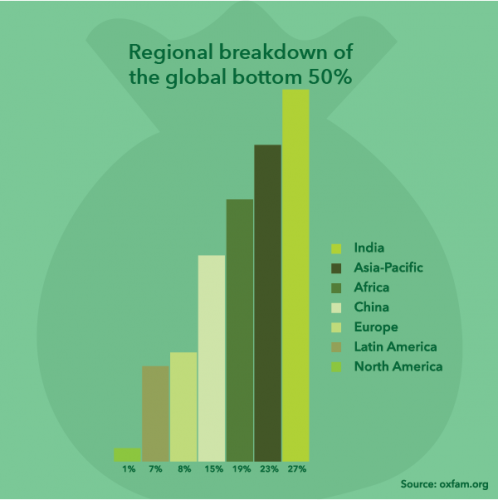The world’s eight richest men are now in possession of the same wealth as the poorest half of the world, according to a new report by Oxfam.
This report confirms what many already know: the wage gap is widening.
“Since 2015, the richest 1 percent has owned more wealth than the rest of the planet,” Oxfam found.
Oxfam also reported last year that the 62 richest people in the world owned the same amount as the poorest half of the world, revealing the staggering increase in the wage gap over just one year.
Corporations play a large part in the widening wage gap, according to the report. Large companies are increasingly dishing out large salaries to executives while paying minimum wage to workers.
The CEO of Walt Disney Company, Robert A. Iger, makes upwards of $44.9 million a year, while park workers barely make above the $8.10 minimum wage, the report found.
Disney began giving out 401(k) plans instead of retirement plans in 2011, and requires many employees to enter into contracts lasting over five years, stating that employees will not receive a raise within the final two years, according Business Insider.
The Walt Disney Company is one of thousands of companies whose pension and bonsus plans may contribute to the widening wage gap.

As of 2015, the average CEO makes 335.1 times the amount an average worker brings home each year, according to AFL-CIO’s PayWatch.
“There is tremendous wealth and poverty in this world, depending on where you are,” Nick Sakkos, a student studying business at DePaul, said. “There is both a lack of opportunity in many parts of the world for people to make a good living, and an ability of those who are rich, to become even richer.”
The average worker, clocking in 40 hours a week, makes about $16.94 an hour, compared to the average living wage in the United States, about $10.60. Workers bring home a mere $6 extra per hour, according to the Oxfam report.
Raj Patel, a student studying accounting and finance at DePaul, is also not surprised by these results.
“Our economy allows the rich to get richer,” Patel said. “Startup businesses can be easily taken over or squashed by big companies.”
In just the past week, Facebook has acquired Oculus VR, a virtual-reality headset company, for $2 billion. This is just one example of a large company buying out a smaller one, gaining more control of the market.
“I think it should be changed if we want everyone to have basic human rights,” said Patel. “This would allow for more competition in the market, which in turn would make the prices (of products) cheaper and the quality better.”
“The distribution can be made more equal by increasing taxes and adding more regulations that don’t make it so easy for rich to make more money,” Patel added.
Emmaline Kelly agrees that there is a problem within the tax system.
“Your tax should be relative to how much money you make,” she said.
Six of the eight billionaires on the list are American, and all are males.
Chris Silber, a DePaul student studying journalism, sees the current state as a reflection of the past.
“If you look back on the history of the world, there’s always been kings and leaders who control the masses and people who have the money,” said Silber. “I don’t think it’s a new thing that’s happened.”
“The leaders we elect, the decisions we make democratically over the past year may point to the fact that the change isn’t as significant as we thought it was over the past century,” Silber said. “But I don’t know if (the rich) contributed to it themselves.”

